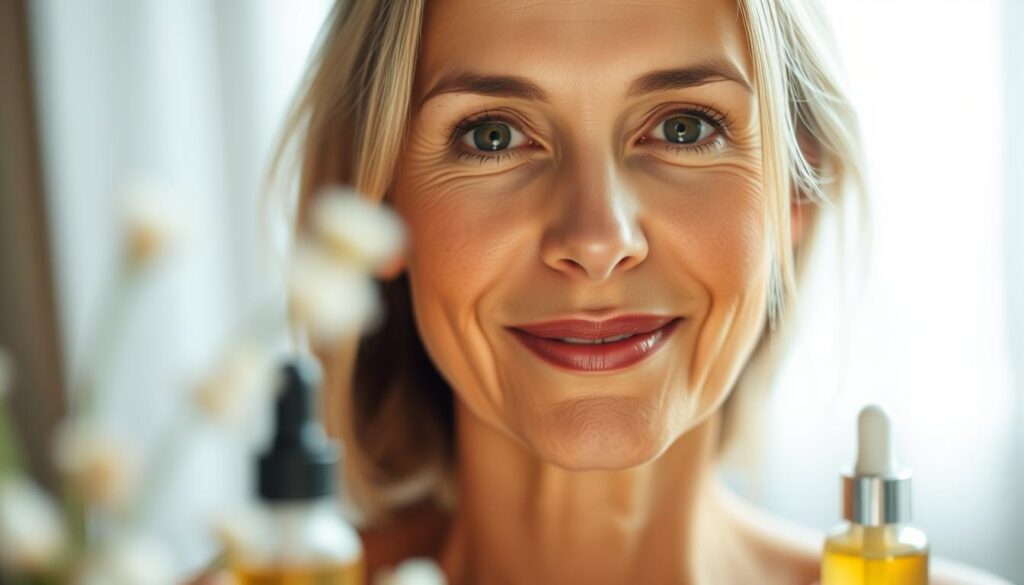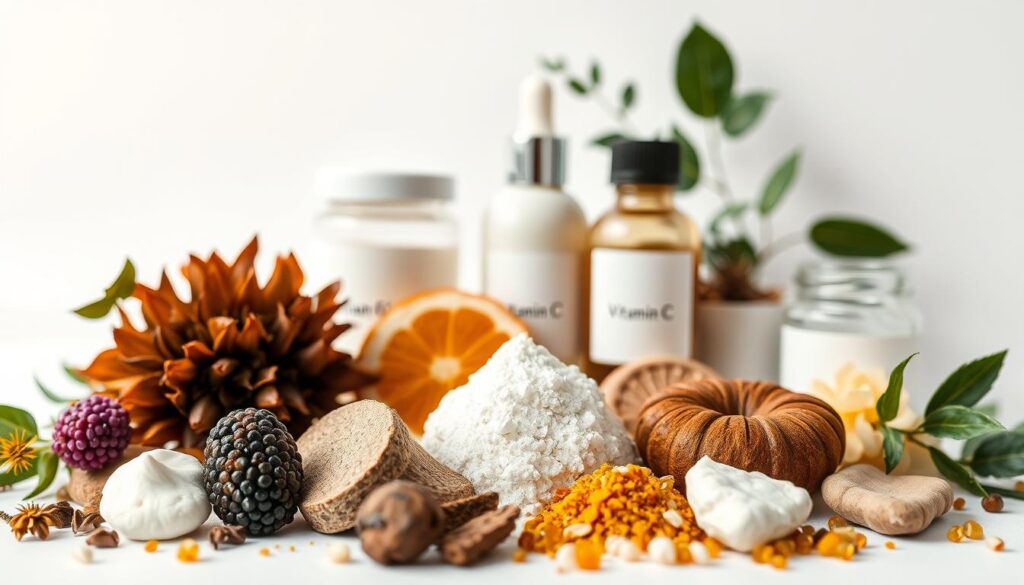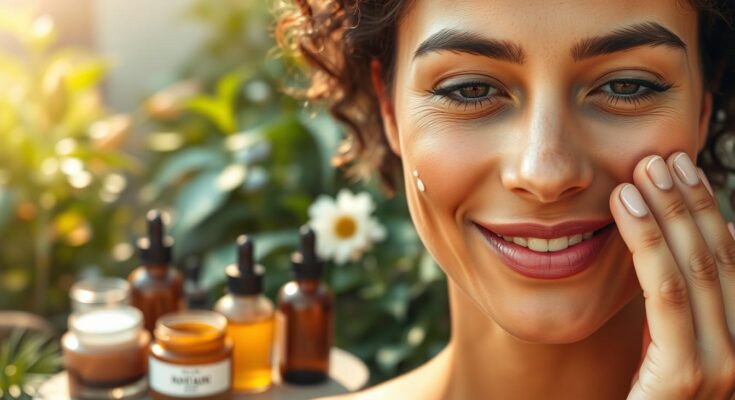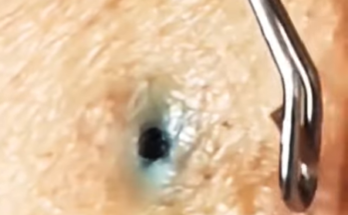As we age, our skin undergoes significant changes that can lead to wrinkles, fine lines, and age spots. Understanding the aging process is crucial to maintaining healthy, youthful-looking skin. Dermatologists, with their expertise in skin health, offer valuable anti-aging advice that can help prevent premature aging.
By following dermatologist-recommended tips, individuals can adopt effective skincare tips and beauty secrets to protect their skin. These expert recommendations focus on preventing early signs of aging, ensuring a smoother, more radiant complexion.
With the right anti-aging advice, it’s possible to maintain a youthful appearance. This introduction sets the stage for the essential beauty tips that can help you achieve healthier, more vibrant skin.
Understanding the Science of Skin Aging
Skin aging is a multifaceted phenomenon influenced by both intrinsic and extrinsic elements. As we delve into the science behind it, understanding the natural aging process, factors that accelerate aging, and the crucial role of proteins like collagen and elastin becomes essential.
How Skin Ages Naturally
Naturally, skin aging is a result of the gradual decline in the production of essential proteins and the reduction in skin’s cellular turnover. This process is influenced by genetics, leading to variations in how individuals age. The skin’s natural aging process involves the thinning of skin layers, reduced collagen production, and decreased elasticity.
Factors That Accelerate Aging
Several external factors can accelerate the aging process, including UV exposure, smoking, and pollution. These elements can cause oxidative stress, damaging skin cells and leading to premature aging. Understanding and mitigating these factors is crucial for maintaining youthful skin.
The Role of Collagen and Elastin
Collagen and elastin are vital proteins that give skin its strength and elasticity. As we age, the production of these proteins decreases, leading to wrinkles and sagging skin. Maintaining healthy levels of collagen and elastin is key to preserving youthful skin.
| Protein | Function | Impact of Aging |
|---|---|---|
| Collagen | Provides skin strength and structure | Decreased production leads to wrinkles and sagging |
| Elastin | Allows skin to snap back into place | Reduced elasticity results in drooping skin |
By understanding the science of skin aging, we can better appreciate the importance of aging prevention techniques and youthful skin tips that help maintain healthy, vibrant skin.
The Difference Between Chronological and Premature Aging
Understanding the distinction between chronological aging and premature aging is crucial for effective beauty maintenance strategies. While chronological aging is a natural process that occurs over time, premature aging is accelerated by various external and internal factors.
Signs of Normal Aging
Chronological aging manifests through fine lines, wrinkles, and age spots. As we age, the skin’s ability to regenerate itself slows down, leading to a loss of firmness and elasticity. These changes are a natural part of aging and are influenced by genetics, hormonal changes, and the passage of time.
Indicators of Premature Aging
Premature aging, on the other hand, is characterized by deep wrinkles, sagging skin, and discoloration at a younger age. Factors such as UV exposure, smoking, and poor skincare routines can accelerate the aging process, leading to premature wrinkles and other signs of aging. Preventing premature wrinkles requires a proactive approach to skincare and lifestyle choices.
How Doctors Assess Skin Age
Dermatologists assess skin age by examining the skin’s texture, elasticity, and the presence of age-related features. They use various methods, including skin analysis tools and clinical evaluations, to determine the skin’s age and recommend appropriate anti-aging advice. This personalized approach helps individuals address their specific skin concerns and develop effective beauty maintenance strategies.
Why Medical Expertise Matters in Anti-Aging Skincare
Medical professionals bring a level of expertise to anti-aging skincare that is hard to find elsewhere. Their extensive knowledge and experience make a significant difference in addressing various skin concerns.
The Limitations of Commercial Beauty Advice
Commercial beauty advice often focuses on marketing trends rather than proven skincare practices. Many products promise unrealistic results, leading to consumer confusion and disappointment. Relying on dermatologist-recommended tips can help individuals avoid costly mistakes and find effective solutions.
How Dermatologists Approach Anti-Aging
Dermatologists approach anti-aging with a scientific mindset, focusing on the underlying causes of skin aging. They recommend evidence-based skincare tips that address specific concerns such as fine lines, wrinkles, and skin discoloration.
Evidence-Based vs. Marketing-Driven Solutions
The skincare industry is filled with marketing-driven solutions that often lack scientific backing. In contrast, dermatologists provide beauty secrets grounded in research and clinical experience, ensuring that patients receive the most effective treatments.
By choosing dermatologist-recommended skincare tips, individuals can make informed decisions about their anti-aging routines, leading to more effective and sustainable results.
Doctors Recommend These 4 Tips to Maintain Your Beauty and Prevent Premature Aging
Doctors have identified four crucial tips that can significantly impact one’s ability to prevent premature aging. These recommendations are backed by medical research and are designed to help individuals maintain a youthful appearance.
The Medical Consensus on Anti-Aging
The medical community agrees that preventing premature aging requires a combination of lifestyle changes and evidence-based skincare practices. Dermatologists emphasize the importance of a comprehensive approach that addresses various factors contributing to skin aging.

Why These 4 Tips Stand Above Others
The four tips recommended by doctors are grounded in scientific evidence and have been shown to be effective in maintaining youthful skin. These practices are not merely cosmetic; they address the underlying causes of skin aging, such as UV damage and collagen degradation.
The Cumulative Effect of Consistent Practice
Consistency is key when it comes to anti-aging. By incorporating these four tips into your daily routine, you can achieve a cumulative effect that enhances your skin’s health and appearance over time. This long-term approach is more effective than seeking quick fixes or relying on expensive products.
By following these doctor-recommended tips, individuals can take a proactive approach to maintaining their beauty and preventing premature aging. The combination of medical expertise and evidence-based practices provides a reliable foundation for achieving youthful skin.
Essential Tip 1: Sun Protection as Your Primary Defense
Dermatologists emphasize that sun protection is the most critical step in any anti-aging skincare routine. The harmful effects of UV radiation on the skin are well-documented, and protecting your skin from the sun is crucial for maintaining its health and youthful appearance.
The Science Behind UV Damage
UV radiation from the sun or tanning beds damages the skin, causing premature aging. This damage affects the skin’s DNA, leading to the breakdown of collagen and elastin, which are essential proteins that give skin its strength and elasticity. As a result, the skin becomes less firm, and wrinkles begin to form.
The UV damage process is cumulative, meaning that the harm builds up over time. This is why sun protection is not just important for preventing sunburn but also for long-term skin health.
Dermatologist-Recommended Sun Protection Strategies
Effective sun protection involves a combination of methods. Dermatologists recommend using sunscreen as a primary defense mechanism.
Daily Sunscreen Application Techniques
To maximize the benefits of sunscreen, apply it correctly. Use a broad-spectrum sunscreen with an SPF of at least 30. Apply it 15-30 minutes before going outdoors and reapply every two hours or immediately after swimming or sweating.
Choosing the Right SPF Products
When selecting a sunscreen, consider your skin type and activities. For daily use, an SPF of 30 is usually sufficient. However, if you spend a lot of time outdoors, consider a higher SPF.
Beyond Sunscreen: Additional UV Protection Methods
In addition to sunscreen, other methods can enhance sun protection. Wearing protective clothing, such as hats and long-sleeved shirts, can provide additional coverage. Seeking shade, especially during peak sun hours (10 am to 4 pm), is also advisable.
By combining these strategies, you can significantly reduce your risk of premature aging and maintain healthier, more youthful-looking skin.
Essential Tip 2: Evidence-Based Skincare Ingredients
Evidence-based skincare ingredients are crucial for effective anti-aging. Dermatologists emphasize the importance of using products with clinically proven ingredients to combat signs of aging.
Retinoids: The Gold Standard in Anti-Aging
Retinoids, derived from vitamin A, are considered the gold standard in anti-aging skincare. They promote cell turnover, reduce fine lines, and improve skin texture.
How to Incorporate Retinoids Into Your Routine
Start with a lower concentration to minimize irritation, and gradually increase as your skin becomes more tolerant. Apply retinoids at night, as they can make your skin more sensitive to sunlight.
Managing Retinoid Sensitivity
To manage sensitivity, use a gentle moisturizer and avoid combining retinoids with other potentially irritating products. If sensitivity persists, consult a dermatologist for guidance.
Antioxidants and Their Protective Benefits
Antioxidants, such as vitamins C and E, help protect the skin from environmental stressors and promote collagen production. They are essential for maintaining healthy, youthful-looking skin.
Vitamin C, E, and Other Key Antioxidants
Vitamin C serums can brighten and firm the skin, while vitamin E oil provides moisturizing benefits. Other key antioxidants include ferulic acid and coenzyme Q10.
Peptides and Growth Factors: The Next Generation
Peptides and growth factors are emerging as significant players in anti-aging skincare. They can stimulate collagen production and improve skin elasticity.
| Ingredient | Benefits | Usage Tips |
|---|---|---|
| Retinoids | Promote cell turnover, reduce fine lines | Start with lower concentration, apply at night |
| Vitamin C | Brighten, firm skin, antioxidant | Use serum in morning, followed by sunscreen |
| Peptides | Stimulate collagen, improve elasticity | Apply peptide serums or creams as part of your daily routine |

Essential Tip 3: Nutrition and Hydration for Skin Health
Nutrition plays a significant role in skin health, and understanding this connection is key to preventing premature aging. A diet rich in essential nutrients not only supports overall health but also enhances skin appearance.
The Skin-Diet Connection
The food we consume has a direct impact on our skin. Certain nutrients can protect the skin from damage, while others can accelerate aging.
Anti-Inflammatory Foods for Skin Health
Foods with anti-inflammatory properties, such as berries, leafy greens, and fatty fish, can help reduce skin inflammation and promote healthier skin.
- Berries are rich in antioxidants.
- Leafy greens are packed with vitamins A, C, and E.
- Fatty fish provide omega-3 fatty acids.
Foods That Accelerate Aging
On the other hand, consuming high amounts of sugar, dairy, and processed foods can lead to inflammation and accelerate the aging process.
| Food Category | Examples | Impact on Skin |
|---|---|---|
| Sugary Foods | Candies, baked goods | Inflammation, glycation |
| Dairy Products | Milk, cheese, yogurt | Hormonal imbalance, inflammation |
| Processed Foods | Fast food, packaged snacks | Inflammation, oxidative stress |
Hydration Strategies for Optimal Skin Function
Adequate hydration is crucial for maintaining skin elasticity and hydration. Drinking enough water is just the beginning.
Beyond Water: Nutrients That Support Hydration
Nutrients like hyaluronic acid, vitamin C, and omega-3 fatty acids play a significant role in maintaining skin hydration and overall skin health.
“Proper hydration is essential for maintaining the skin’s natural barrier function and elasticity.” – Dr. Jane Smith, Dermatologist
Supplements with Clinical Evidence for Skin Benefits
Certain supplements have been shown to support skin health. These include omega-3 fatty acids, vitamin D, and probiotics.
- Omega-3 fatty acids reduce inflammation.
- Vitamin D supports skin cell growth.
- Probiotics enhance gut-skin axis.
Essential Tip 4: Sleep and Stress Management
Doctors emphasize that sleep and stress management play a significant role in preventing premature aging. Adequate rest and effective stress reduction techniques are crucial for maintaining healthy, youthful skin.
The Science of Beauty Sleep
During sleep, the body repairs and regenerates damaged skin cells. This process is vital for maintaining skin elasticity and reducing the appearance of fine lines and wrinkles.
Optimizing Sleep for Skin Regeneration
To maximize the skin benefits of sleep, it’s essential to establish a consistent sleep schedule and create a sleep-conducive environment. This includes keeping the bedroom cool, dark, and quiet.
Sleep Position and Wrinkle Formation
Sleeping on your side or stomach can lead to wrinkle formation due to the pressure on the skin. Sleeping on your back is recommended to minimize wrinkle formation.
Stress Reduction Techniques with Proven Skin Benefits
Chronic stress can have detrimental effects on the skin, including increased inflammation and reduced collagen production. Effective stress management techniques are essential for mitigating these effects.
Mind-Body Approaches to Combat Aging
Techniques such as meditation and yoga have been shown to reduce stress levels and promote overall well-being, including skin health.
The Cortisol-Collagen Connection
Cortisol, a hormone released in response to stress, can break down collagen, leading to skin sagging and wrinkle formation. Managing stress through relaxation techniques can help maintain collagen levels.
| Stress Reduction Technique | Skin Benefit |
|---|---|
| Meditation | Reduces inflammation, promotes collagen production |
| Yoga | Improves skin elasticity, reduces wrinkle formation |
| Deep Breathing Exercises | Lowers cortisol levels, enhances skin regeneration |
As Dr. Andrew Weil notes, “Stress management is crucial for maintaining healthy skin.”
“Chronic stress can lead to inflammation, which is associated with various skin conditions, including acne, psoriasis, and eczema.”
Implementing the 4 Essential Tips: A Practical Guide
A well-rounded anti-aging strategy involves incorporating the four essential tips into your daily routine. By doing so, you can effectively maintain your skin’s health and appearance.
Creating a Sustainable Anti-Aging Routine
To create a sustainable anti-aging routine, start by integrating the four essential tips into your daily skincare regimen. This includes practicing sun protection, using evidence-based skincare ingredients, maintaining proper nutrition and hydration, and managing sleep and stress.
| Tip | Action | Benefit |
|---|---|---|
| Sun Protection | Use broad-spectrum sunscreen daily | Prevents UV damage |
| Evidence-Based Skincare | Use products with retinoids and antioxidants | Promotes collagen production and reduces fine lines |
| Nutrition and Hydration | Maintain a balanced diet and hydrate adequately | Supports skin health and elasticity |
| Sleep and Stress Management | Practice good sleep hygiene and stress reduction techniques | Reduces cortisol levels and promotes skin repair |
Adjusting Your Approach by Age and Skin Type
It’s essential to adjust your anti-aging strategy based on your age and skin type. For instance, younger individuals may focus more on prevention, while older individuals may need to address existing concerns like wrinkles and age spots.
When to Consult a Dermatologist
If you’re unsure about your skin care or have specific concerns, consult a dermatologist. They can provide personalized recommendations based on your skin type and needs.
Tracking Progress and Adjusting Your Strategy
Regularly track your progress and adjust your anti-aging strategy as needed. This may involve tweaking your skincare products, lifestyle habits, or consulting with a dermatologist for further guidance.
By following these practical guidelines, you can effectively implement the four essential tips and maintain healthy, youthful-looking skin.
Common Anti-Aging Myths Debunked by Dermatologists
Dermatologists often encounter misconceptions about anti-aging that can lead to ineffective skincare routines. Many of these myths stem from marketing claims rather than scientific evidence.
Expensive Products vs. Effective Ingredients
A common myth is that expensive products are always more effective. However, the price of a product doesn’t necessarily determine its efficacy. Effective anti-aging ingredients such as retinoids, peptides, and antioxidants can be found in products across various price ranges.
Separating Marketing Claims from Medical Evidence
It’s crucial to differentiate between marketing claims and medical evidence. Dermatologists recommend looking for products backed by clinical trials and scientific research rather than those relying on aggressive marketing tactics.
The Truth About “Miracle” Treatments
The term “miracle” is often misused in the anti-aging industry. While some treatments can significantly improve skin appearance, there are no overnight miracles. Consistency and patience are key to achieving desired results.
Why Prevention Trumps Correction
Prevention is always more effective than correction when it comes to anti-aging. Establishing a good skincare routine early on can prevent many signs of aging, reducing the need for corrective treatments later in life.
Conclusion
Doctors recommend these 4 tips to maintain your beauty and prevent premature aging, emphasizing a comprehensive approach to anti-aging. By incorporating sun protection, evidence-based skincare, nutrition and hydration, and sleep and stress management into your daily routine, you can effectively maintain your beauty and reduce the visible signs of aging.
Beauty maintenance strategies that are grounded in medical evidence can make a significant difference in how you look and feel. By understanding the science behind skin aging and adopting a proactive approach, you can enjoy healthier, more youthful-looking skin for years to come.
By following these doctor-recommended tips and maintaining a consistent routine, you can take control of your skin health and overall beauty. This holistic approach not only enhances your appearance but also contributes to your overall well-being.
FAQ
What are the most effective ways to prevent premature aging?
According to dermatologists, the most effective ways to prevent premature aging include sun protection, using evidence-based skincare ingredients, maintaining a healthy diet and hydration, and managing stress and sleep.
How does sun protection help in preventing premature aging?
Sun protection is crucial as UV damage is a significant contributor to premature aging. Using sunscreen daily, wearing protective clothing, and seeking shade when the sun is strong can help prevent UV-induced skin damage.
What skincare ingredients are recommended by dermatologists for anti-aging?
Dermatologists recommend using skincare products containing retinoids, antioxidants like vitamin C and E, and peptides/growth factors. These ingredients have been shown to improve skin texture, reduce fine lines, and promote collagen production.
Can nutrition and hydration really impact skin health?
Yes, a diet rich in anti-inflammatory foods, adequate hydration, and certain nutrients can support skin health and reduce the signs of aging. Foods high in antioxidants and omega-3 fatty acids are particularly beneficial.
How does sleep and stress management affect skin aging?
Poor sleep and chronic stress can accelerate aging by increasing cortisol levels, which can break down collagen. Practicing good sleep hygiene and stress reduction techniques like meditation can help mitigate this effect.
Are expensive skincare products always more effective?
No, the effectiveness of a skincare product is not directly related to its price. It’s more important to look for products containing evidence-based ingredients rather than relying on marketing claims or price.
When should I consult a dermatologist about my anti-aging concerns?
It’s advisable to consult a dermatologist if you’re concerned about your skin aging, have specific skin issues, or are unsure about the best skincare routine for your skin type and concerns.
How can I track the progress of my anti-aging skincare routine?
Keeping a skincare journal, taking regular photos, and monitoring how your skin responds to different products and practices can help you track progress and make necessary adjustments.



